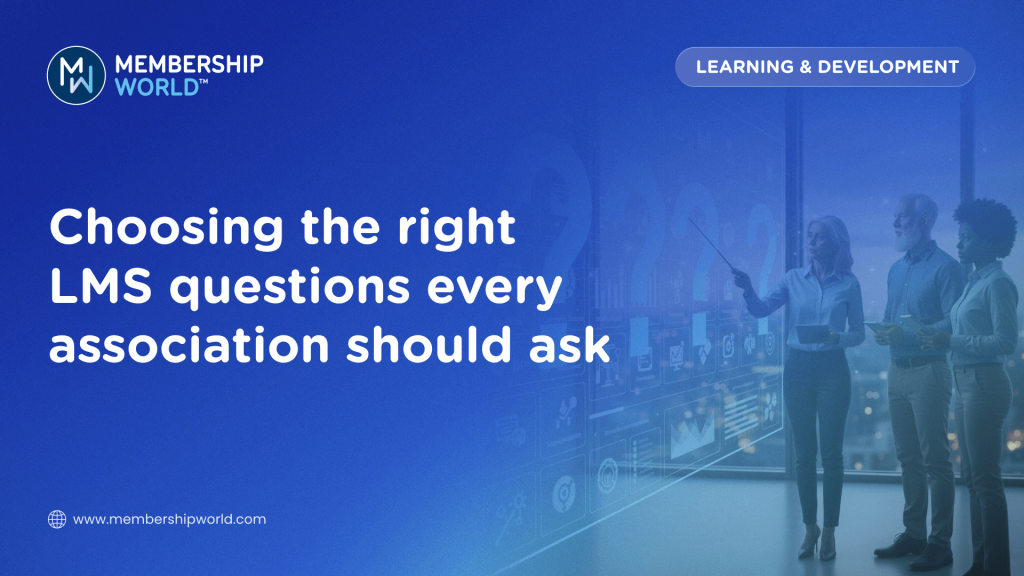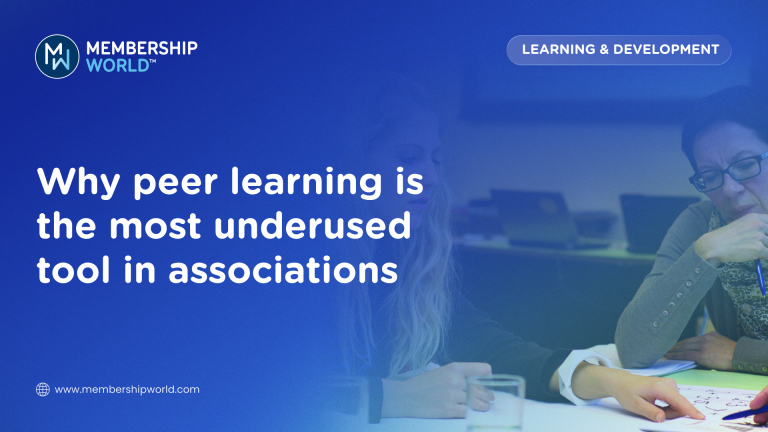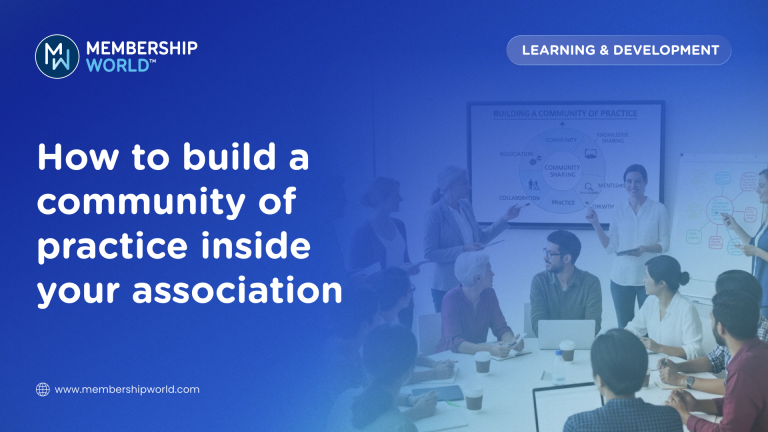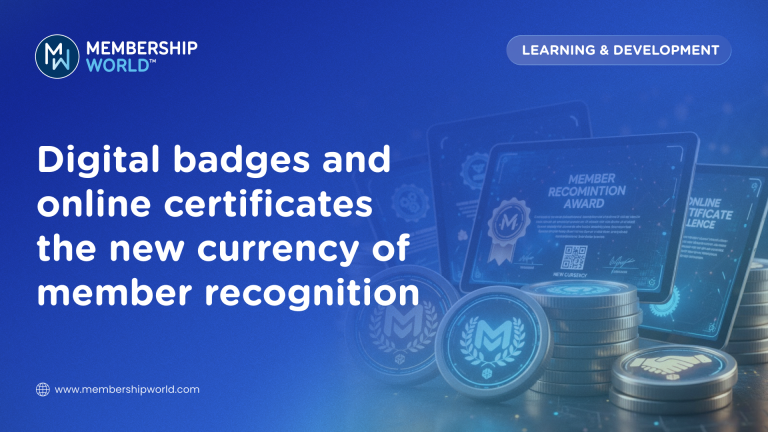
Selecting a Learning Management System (LMS) might be one of the most important decisions an association makes — and one of the most confusing.
There’s no shortage of platforms that promise to “transform learning” or “engage members like never before.” But most associations quickly realise that the challenge isn’t about features. It’s about fit — how well the system supports your goals, your members, and your team.
The right LMS can help members grow, strengthen your professional community, and even become a new source of revenue. The wrong one? It can drain budgets, frustrate staff, and leave learners disengaged.
Before signing any contracts, here are the key questions every association should ask.
TLDR:
- Picking an LMS is about strategy, not just software features
- The best systems align with your member experience and long-term goals
- Asking the right questions early can save time, cost, and headaches later
- Think beyond “what it does” to “what it helps members achieve”’
- What role does learning play in your association’s strategy?
Before talking to vendors, associations need clarity on why they want an LMS.
Ask yourself:
- Is learning a core member benefit or an added service?
- Do you want to generate revenue from courses, or simply deliver value?
- Will your learning programs be certification-based, informal, or a mix?
This clarity shapes every other decision. If your goal is member retention, you’ll prioritise engagement features. If it’s about industry certification, you’ll care more about compliance and assessment tools.
An LMS should reflect your strategy — not define it.
- Who are your learners, and how do they prefer to learn?
Your members aren’t all the same. Some are digital natives who want short, mobile-friendly learning. Others prefer deep, structured programs.
Ask:
- Do your members learn on mobile devices?
- Are they time-poor professionals looking for bite-sized content?
- Do they expect blended experiences — online plus live sessions?
- How comfortable are they with technology?
Understanding learner behaviour helps you choose an LMS that fits how your members want to engage — not how a vendor thinks they should.
- How well does it integrate with your existing systems?
A common frustration: buying an LMS that doesn’t “talk” to your CRM, AMS, or website. That means duplicate data, lost records, and messy member experiences.
Ask vendors:
- Can the LMS integrate directly with your membership database?
- Will course completions and badges automatically appear in member profiles?
- Does it support single sign-on (SSO) so members don’t need multiple logins?
Integration isn’t glamorous, but it’s what makes learning feel seamless for members — and manageable for staff.
- What will the member experience actually feel like?
The LMS may look impressive in a demo, but what happens when a member logs in at 10 p.m. after a long day?
Ask to see real examples of:
- Course navigation (is it intuitive or confusing?)
- Progress tracking (can members see what they’ve achieved?)
- Mobile experience (is it responsive and reliable?)
- Community features (can members connect or discuss topics?)
A great LMS feels effortless — it encourages members to keep learning without frustration.
- How does it handle credentials, certificates, and badges?
In today’s skills-driven world, members expect visible recognition of their learning.
Ask how the LMS supports:
- Digital badges that can be shared on LinkedIn or member profiles
- Automated certificates
- Micro-credentials or stackable learning pathways
Recognition motivates participation and helps members showcase value back to their employers — making your association’s learning programs more attractive.
- Can you easily update and manage content in-house?
Associations evolve, and so should their learning content. A flexible LMS lets you make quick updates without needing constant vendor support.
Ask:
- How easy is it to upload or edit a course?
- Can non-technical staff manage learning content?
- Are there built-in templates or authoring tools?
If it takes days (or developer hours) to post a new resource, that’s a red flag.
- How does it support reporting and analytics?
You can’t improve what you can’t measure. Look for an LMS that gives you insights beyond basic completion rates.
Ask:
- What reports are available by default?
- Can I see which courses drive renewals or engagement?
- Does the system track learner behaviour trends?
Analytics should help you answer questions like: Which programs create the most member value? and How is learning impacting retention?
- What’s the real cost — and what’s included?
LMS pricing can be tricky. Some charge per user, per course, or for support. Others hide costs in setup, storage, or upgrades.
Before signing, ask vendors to outline:
- Setup and migration costs
- Ongoing license or subscription fees
- Support, training, and customisation fees
- Future upgrade policies
Remember: the cheapest option upfront isn’t always the best long-term investment.
- How will support and onboarding work?
Even the best technology fails without proper onboarding. Make sure your vendor will be a true partner, not just a software provider.
Ask:
- How much training will our staff receive?
- What kind of ongoing support is included?
- How quickly do they respond to issues?
- Do they have experience with associations specifically?
A good vendor relationship should feel like a partnership built on trust, responsiveness, and shared goals.
- How will the LMS evolve with you?
Your association won’t look the same in three years. Your LMS shouldn’t either.
Ask vendors:
- What’s on their product roadmap?
- How do they incorporate client feedback into updates?
- Is the platform scalable if your membership doubles?
The right system should grow with your strategy — not become a roadblock when you’re ready to expand.
Final Thoughts
Choosing the right LMS isn’t about chasing the latest technology. It’s about designing a learning experience that feels meaningful, seamless, and valuable to your members.
If you focus on clarity — what your members need, what your staff can manage, and what aligns with your mission — you’ll find the right fit.
Because in the end, the best LMS isn’t the one with the most features. It’s the one that helps your members learn, grow, and stay connected to your community.
💬 What lessons has your association learned from choosing or switching LMS platforms?



